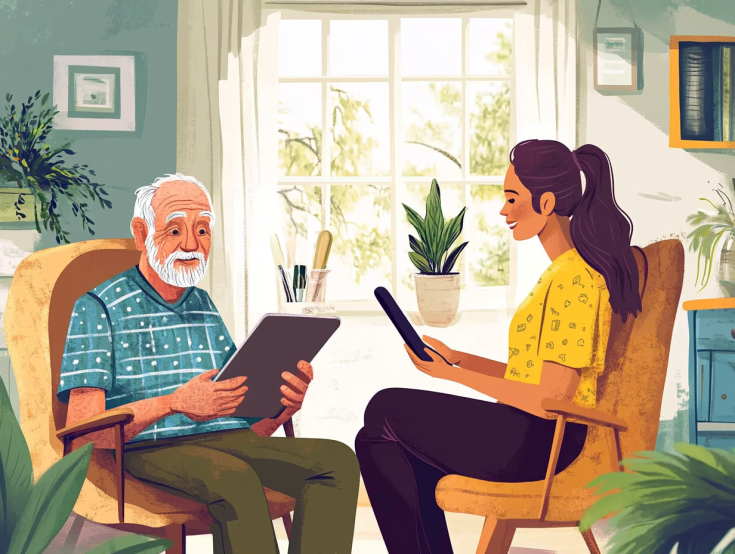Loneliness and social connections

Loneliness is most commonly defined as a negative subjective experience of low quality and/or quantity of one’s social network. It is an emotional state that arises from not having the desired sufficient meaningful connections with others.
Data based on the American Time Use Survey shows that people who have more social interactions are happier with their lives. In contrast, those who see themselves as “living their worst possible life” are more likely to have limited social interactions. Considering the adverse health effects associated with loneliness it has become a global public health concern.
In 2023, the World Health Organization (WHO) declared loneliness a “global public health concern”. This came at the backdrop of the Covid pandemic which increased the sense of isolation among a large portion of the global population but also raised awareness on the issue as such. It has been estimated that globally every 4th adult experiences social isolation.
According to the WHO lacking social connection and loneliness is linked to anxiety, depression, suicide, and dementia and can increase risk of cardiovascular disease and stroke. With the declaration, the WHO also launched an international commission on loneliness called the “Commission on Social Connection”.
Several years earlier, the largest-ever study into the issue of loneliness - The Loneliness Experiment - was carried out in the UK. The study, which targeted over 55 000 people, found that regardless of age, loneliness was found to be higher among the unemployed, blind and partially sighted, not in a relationship nor in a parental role. Interestingly, the study found that respondents who live alone were only slightly more likely to feel lonely more often. According to the authors, that finding suggests that living alone isn't as much of a problem as spending lots of time alone.
In the EU, the first ever EU-wide survey on loneliness was published in 2022. The survey of 25 000 Europeans found that “13% of respondents report feeling lonely most or all of the time over the past four weeks, while 35% report being lonely at least some of the time.” Among others, the survey found that the prevalence of loneliness decreases with increased age, income, and education and that having several meaningful relationships is associated with lower loneliness levels, but the frequency of contact also matters.
The results also show that individuals feeling lonely most or all of the time are three times as likely to assess their health status as poor and are also more likely to be depressed and tend to engage more in unhealthy behaviours, such as smoking and having a poor diet.
The above examples indicate that loneliness is a more important public policy matter than often given credit to. It sends a signal to policy makers that facilitating social interactions is something that needs to be in the arsenal of 21st century social cohesion and public health policies.
“Grandchildren for Rent”
This raises the question of how to address social isolation effectively. The NOTRE project has shared with the Interreg Europe Community a relevant practice called “Grandchildren for Rent". This practice from Italy is tackling loneliness and social exclusion of the elderly with health problems, while also passing on relevant digital skills needed to engage in contemporary society.
Through the free service, the elderly get assistance with booking medical visits, accessing health portals, submitting paperwork on other public administration portals as well as getting an empathetic companion who assists throughout the process. The latter gives the elderly much-needed psychological and emotional closeness through interacting with the young generation.
The idea was initially developed by was Senex, an Italian start-up located in the city of Bari. The service is now offered by the Italian National Cancer Association (ANT) with the financial support of a Bologna-based credit institution EmilBanca. However, the core of the idea could also be implemented by the public sector in other regional realities. In this sense, it is also a great example of how complicated social challenges are best solved in multistakeholder collaboration.
ANT was interested in the service model as the increased technological competence of the elderly patients would make them more independent in the use of technological and digital devices and thus make it easier for them to book medical visits and to create a digital identity to access public administration services.
In other words, it is about providing the target group with the skills needed to be able to provide telemedicine home care services and reduce the burden on the social welfare system. Importantly the service is great for mental health as it empowers older people to navigate digital tools independently and contributes to their overall sense of autonomy and integration while also interacting with young people to reduce a sense of loneliness.
While already active in Bologna, there are plans to transfer the service to other Italian regions like Puglia, Campania, Piedmont, Lombardy, Sicily, Liguria. This underlines the service's potential to be a model for similar initiatives addressing the evolving needs of aging populations in Europe. Furthermore, other such examples of tackling the loneliness of the elderly through public policy are emerging, some already identified in other Interreg Europe projects such as KORALE.
To go further: “Loneliness in Europe. Determinants, Risks and Interventions” (2024), authored by the Joint Research Centre.
